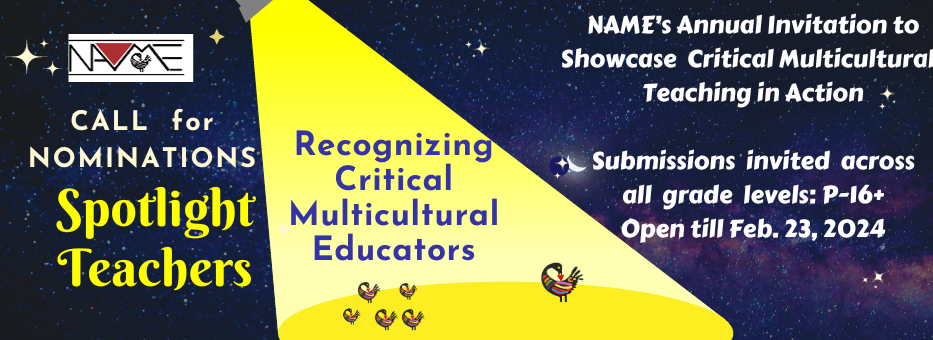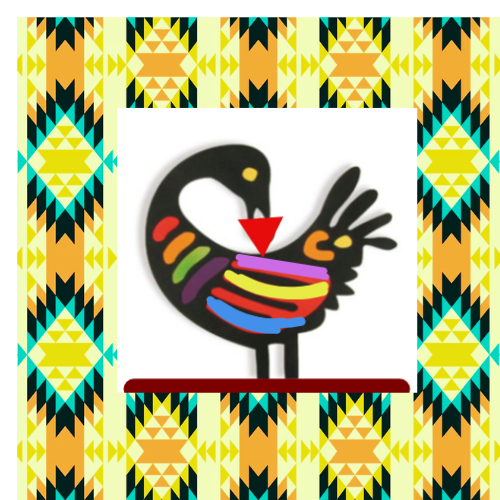Nominations are NOW OPEN for NAME's
Teacher Spotlight: Learning with a Critical Multicultural Educator
NAME is looking for critical multicultural education teachers!
NAME members may submit nominations until February 23, 2024
Questions? Email address: AdvanceMCL@NAMEorg.org
We invite NAME members to submit nominations for the 2023 featured teacher. Nominations may be made by yourself or by someone else. Nominees need not be a member of NAME at the time of the nomination. We do ask that those submitting nominations for self or others be NAME members.
Nominations are accepted until FEBRUARY 23, 2024 at midnight in the nominator's time zone.
Nomination Materials & Considerations Details
- Up to 5 minutes of video of the nominee teaching, i.e. enacting multicultural, social justice, culturally responsive teaching; may also include students, parents/guardians, yourself explaining something, but the main focus should be on the nominee’s practice in the classroom. (This may be 5 minutes consecutive or shorter segments joined together.) Please note that we are not looking for professional video production. (Bells and whistles, if any, should be part of your intended instruction, not additions to the video presentation). All we need is clear video and audible audio in an accessible format in order to assess it. Submit via YouTube or Vimeo, and send us the link. Please email us for help, if neither of these options work for you.
- A maximum of five-page single-space description of how the nominee works to develop the student outcomes listed below, with specific reference to the work in the video that illustrates the nominee’s pedagogy.
- The nominee’s name, current school or other institution, grade level and/or subject area(s), and contact information (email address, mailing address, phone number).
All materials are due by midnight, in the nominee’s time zone (at the time of submission), February 23, 2024. The Advancing Multicultural Learning Committee will review nominations to select one teacher. A case study of that teacher (including video of teaching we will support making) will be developed for the NAME website. The selected teacher will also be recognized at NAME’s award ceremony at the annual National conference.
Nominations will be evaluated based on how well they speak to the five student outcomes of multicultural education:
Student Outcomes of Multicultural Education in the Classroom
Develop Positive Social Identities
Students perceive themselves and members of their own identity groups as intellectually capable and able to achieve at very high levels. They connect their own knowledge and sense of purpose with challenging academic skills and concepts. They are able to use tools of inquiry to ask questions, develop informed opinions, and co-construct knowledge with peers and adults, and they communicate knowledge clearly, using multiple forms of communication. Students use these academic skills to develop social justice consciousness and take action for social justice in their schools and communities.
Engage Respectfully with Diverse People
Students develop language and knowledge to accurately describe how people are both similar to and different from each other and themselves. They respectfully express curiosity about others, examining diverse experiences and perspectives in their social, political and historical contexts, exchanging ideas and beliefs in an open-minded way. They build empathy, understanding, respect, and connection across differences and similarities. Respectful engagement requires examining privilege(s) that derive from one’s social identities and thinking critically about ways to deconstruct privileged hierarchies in society.
Develop Social Justice Consciousness
Students recognize unfairness on the individual level and injustice at the institutional or systemic level, locally, nationally, and globally, analyzing its harmful impact on themselves and others. They link their own well-being with that of people who differ from themselves and understand that one’s well-being may result from the marginalization of others. They identify key figures and groups, seminal events, strategies and philosophies relevant to social justice history around the world. Students also actively pursue alternative perspectives by searching for and examining traditionally marginalized viewpoints and ways of knowing and being.
Take Action for Social Justice
Students recognize their own responsibility to resist exclusion, prejudice and injustice in their everyday lives, despite pressure from others to do otherwise or displeasure from those around them who may thwart their efforts for social justice. Based on an analysis of roots of discrimination and colonization, and working as allies for equity and justice, they plan and carry out strategies of participatory democratic activism, and evaluate the effectiveness of various strategies.
Develop Positive Academic Identities
Students develop language, as well as historical and cultural knowledge, that affirms and accurately describes their membership in multiple identity groups, which may include but are not limited to identities related to race, ethnicity, gender, sexuality, nationality, language, ability, religion, socioeconomic status, age, and geography. They learn to recognize how peoples’ multiple identities interact to create unique and complex individuals. They express pride, confidence and healthy self-esteem without denying the value and dignity of other people, and they effectively negotiate differences between their home and community cultures and the dominant culture.
NAME members may submit nominations by 12 midnight, in the nominee’s time zone, February 23, 2024
Questions? AdvanceMCL@NAMEorg.org


